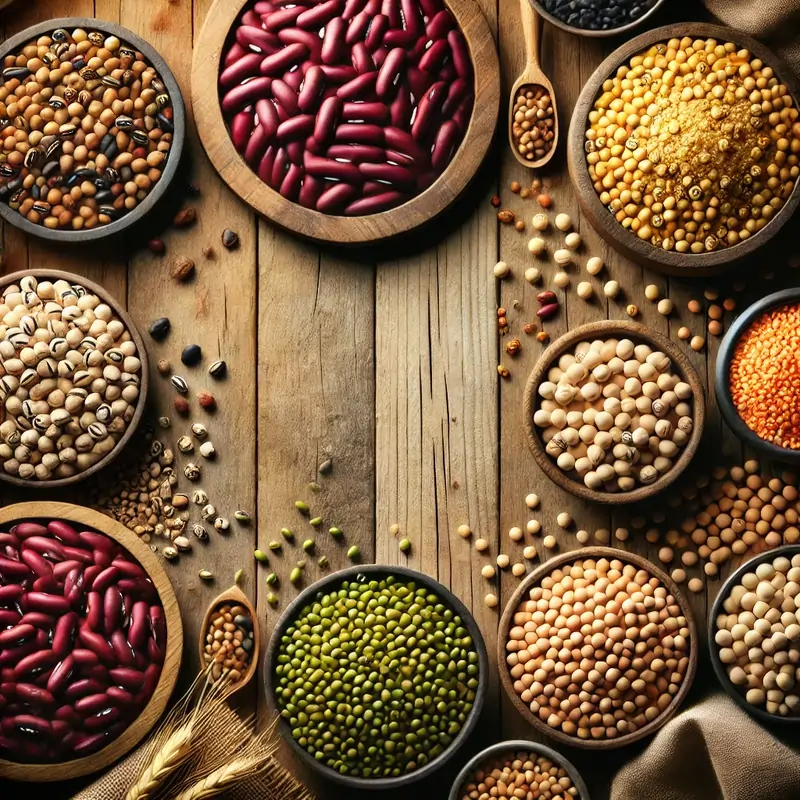Beans: A Nutrient Powerhouse with Cautionary Notes
Beans are an essential part of many diets worldwide, providing a rich source of protein, fiber, and essential nutrients. They are especially valuable for vegetarians and those seeking plant-based nutrition. However, not all beans are equally beneficial, as some can cause digestive issues, gas, or even long-term health concerns if consumed in excess. Understanding the merits and demerits of different types of beans allows us to make informed dietary choices. This article explores the benefits and drawbacks of various beans and provides insights into how to consume them wisely for optimal health.
Chickpeas (Garbanzo Beans)
Chickpeas are a widely used legume with a sweet-astringent taste. They are nutritious and easy to digest, especially when combined with grains. Sprouted chickpeas are highly beneficial, but fried ones can cause acidity.
Merits:
- Nutritious and easy to digest
- Beneficial in dry and mixed diets
- Sprouted chickpeas are good for all
Demerits:
- Can cause gas and stomach pain with frequent consumption
- Fried chickpeas may lead to acidity and blood defects
Kidney Beans (Rajma)
Kidney beans have a sweet-astringent taste and are heavy to digest. They are useful in dry and mixed diets but may have adverse effects when consumed daily.
Merits:
- Nutritious and beneficial in dry and mixed diets
- Provides energy and supports overall health
Demerits:
- Can cause gas, eye defects, and impotence with excessive use
- More negative effects for nerve-sensitive individuals
Lentils (Black Lentils & Orange Lentils)
Lentils are a staple protein source with a sweet taste. Black lentils are heavier to digest and are ideal for winter diets, while orange lentils share similar effects but can slightly harden stool.
Merits:
- Acts as a tonic and supports nerve health
- Excellent for winter diets
Demerits:
- Daily use may lead to blood defects
- Orange lentils can cause slight constipation
Mung Beans (Green Gram)
Mung beans are sweet-astringent, easy to digest, and highly nutritious. They are beneficial for the mucous and blood circulatory systems and are especially valuable in liquid diets for fever.
Merits:
- Easy to digest and highly nutritious
- Beneficial for mucous and blood circulation
- Excellent in liquid diets for fever
- Best consumed in summer
Demerits:
- May cause gas if consumed excessively
- Should be prepared as a soup with butter or ghee for better digestion
Masura Beans (Red Lentils)
Masura beans are sweet-astringent and heavy to digest. They have medicinal value in liquid diets, particularly for diarrhea, but can cause constipation in dry and mixed diets.
Merits:
- Beneficial for mucous and blood circulatory-natured individuals
- Medicinal value in liquid diets, especially for diarrhea
Demerits:
- Heavy to digest
- Can cause constipation in dry and mixed diets
Soybeans
Soybeans are a high-protein legume with a sweet-astringent taste. They are highly nutritious but heavy to digest and can cause digestive issues if consumed regularly.
Merits:
- Rich in protein and acts as a tonic
- Beneficial for mucous-natured individuals
Demerits:
- Difficult to digest and may cause gas, diarrhea, and blood defects
- Fried soybeans can lead to acidity if consumed daily
- Requires strong digestion for proper utilization
Sweet Peas (Green Peas)
Sweet peas share similar properties with chickpeas but tend to create more gas. However, fresh green peas do not cause gas and have medicinal value for duodenal ulcers.
Merits:
- Similar benefits as chickpeas
- Fresh green peas do not cause gas
- Medicinal value in cases of duodenal ulcers
Demerits:
- Can cause excessive gas in dried or cooked form
General Considerations for Eating Beans
Most beans create gas, especially for individuals with a nerve-dominated constitution. To counteract this, beans should be prepared with butter, ghee, oil, or carminative spices along with citrus juice. Beans are less beneficial in winter and should be consumed in moderation. Germinating beans before consumption significantly reduces their gas-producing effects. Among all varieties, mung beans are the best choice for daily consumption due to their balanced nutrition and easy digestibility.
Conclusion: The Right Beans for the Right Diet
Beans offer a wealth of nutritional benefits but must be consumed mindfully to avoid digestive and health issues. Choosing the right type of bean, preparing it correctly, and consuming it in moderation can help maximize the benefits while minimizing potential drawbacks. Mung beans emerge as the safest and most beneficial option for daily intake, while other beans should be included based on individual health needs and digestive capacity.
Author
Dr. Mana Bajra Bajracharya
Original Year Published: 1978

